Facebook's Cambridge Analytica Scandal: An OB Analysis Report
VerifiedAdded on 2023/03/23
|15
|3539
|40
Report
AI Summary
This report delves into the Facebook Cambridge Analytica scandal, examining the context, consequences, and organizational behavior factors that contributed to the failure. It discusses how Cambridge Analytica harvested millions of Facebook user profiles without consent for political advertising, leading to reputational damage, stock price drops, and regulatory scrutiny. The report identifies structural flaws and technological vulnerabilities within Facebook that enabled the data breach, and analyzes the impact on stakeholders, including users and investors. A SWOT analysis of Facebook is presented, highlighting its strengths, weaknesses, opportunities, and threats. Furthermore, the report evaluates Facebook's initiatives to combat the failure and provides recommendations for improving data protection and restoring trust. This analysis offers insights into the critical role of organizational behavior in preventing and managing crises in the digital age, and emphasizes the importance of ethical leadership and robust data governance.
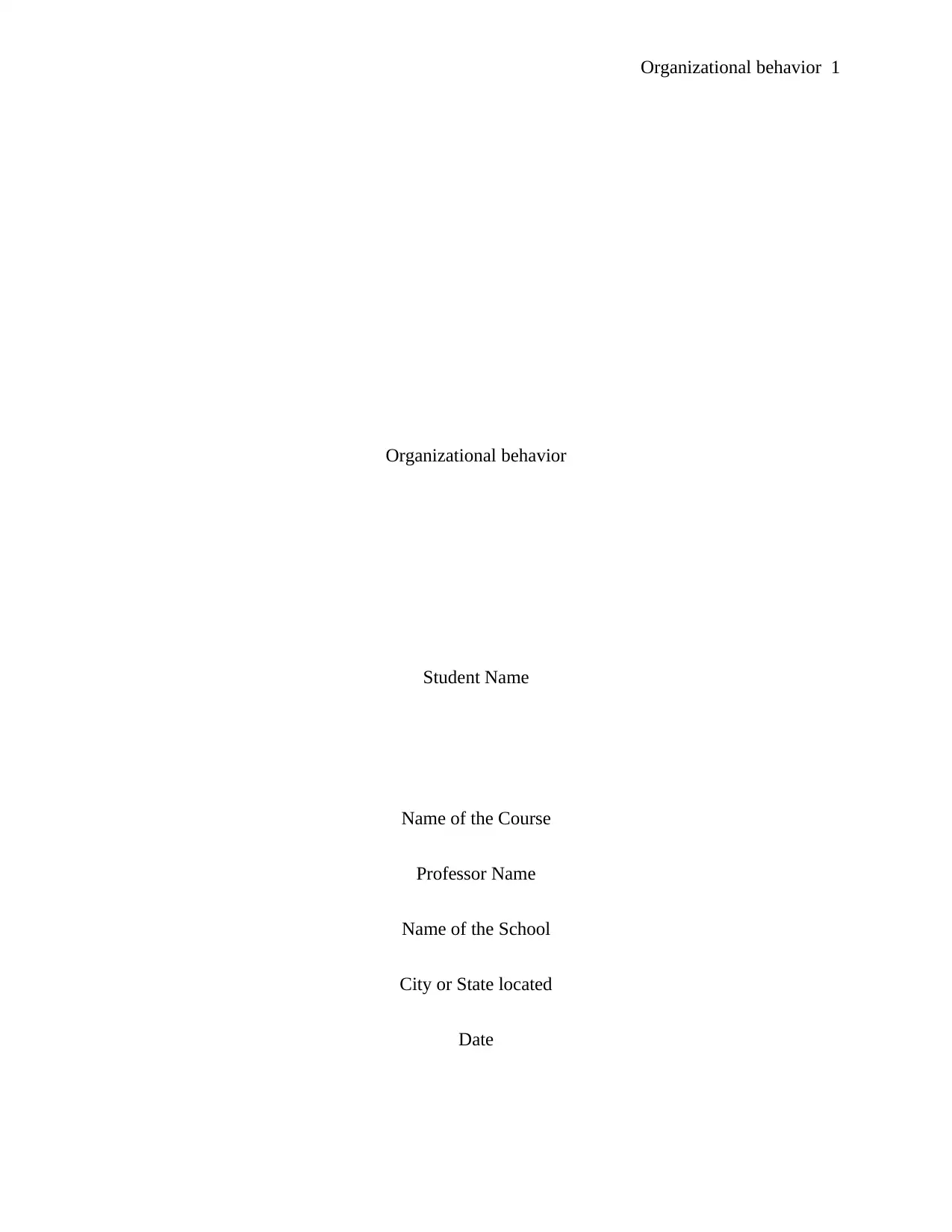
Organizational behavior 1
Organizational behavior
Student Name
Name of the Course
Professor Name
Name of the School
City or State located
Date
Organizational behavior
Student Name
Name of the Course
Professor Name
Name of the School
City or State located
Date
Paraphrase This Document
Need a fresh take? Get an instant paraphrase of this document with our AI Paraphraser
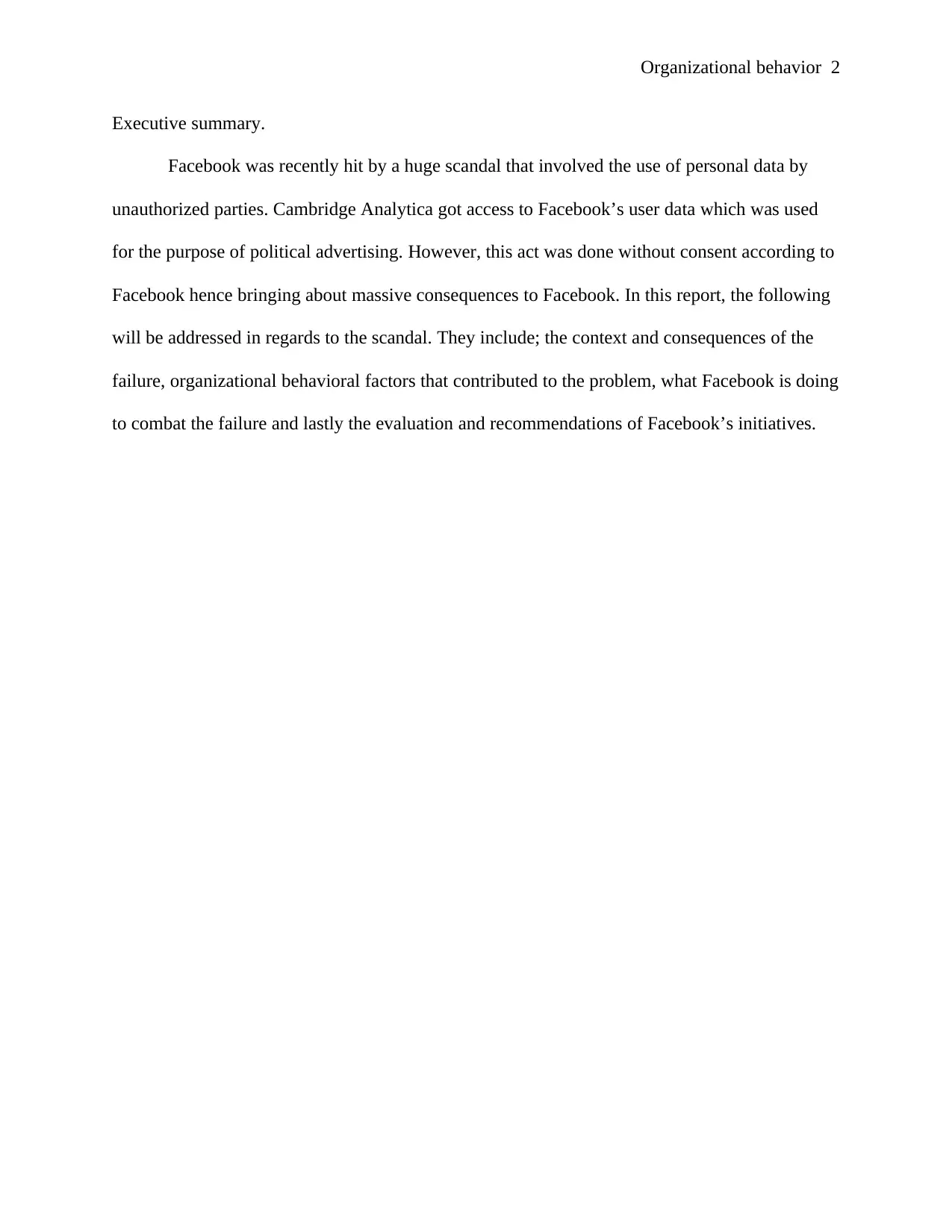
Organizational behavior 2
Executive summary.
Facebook was recently hit by a huge scandal that involved the use of personal data by
unauthorized parties. Cambridge Analytica got access to Facebook’s user data which was used
for the purpose of political advertising. However, this act was done without consent according to
Facebook hence bringing about massive consequences to Facebook. In this report, the following
will be addressed in regards to the scandal. They include; the context and consequences of the
failure, organizational behavioral factors that contributed to the problem, what Facebook is doing
to combat the failure and lastly the evaluation and recommendations of Facebook’s initiatives.
Executive summary.
Facebook was recently hit by a huge scandal that involved the use of personal data by
unauthorized parties. Cambridge Analytica got access to Facebook’s user data which was used
for the purpose of political advertising. However, this act was done without consent according to
Facebook hence bringing about massive consequences to Facebook. In this report, the following
will be addressed in regards to the scandal. They include; the context and consequences of the
failure, organizational behavioral factors that contributed to the problem, what Facebook is doing
to combat the failure and lastly the evaluation and recommendations of Facebook’s initiatives.
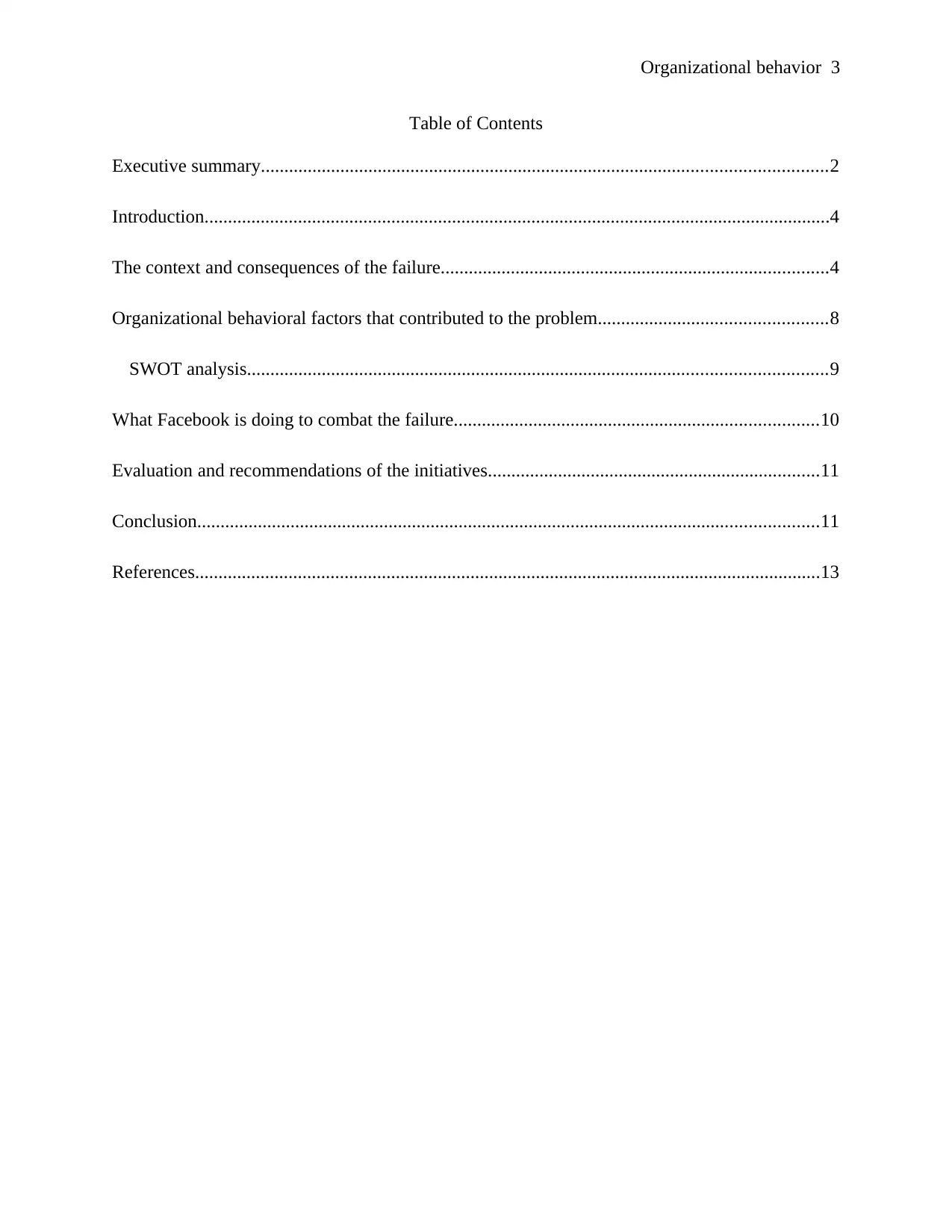
Organizational behavior 3
Table of Contents
Executive summary.........................................................................................................................2
Introduction......................................................................................................................................4
The context and consequences of the failure...................................................................................4
Organizational behavioral factors that contributed to the problem.................................................8
SWOT analysis............................................................................................................................9
What Facebook is doing to combat the failure..............................................................................10
Evaluation and recommendations of the initiatives.......................................................................11
Conclusion.....................................................................................................................................11
References......................................................................................................................................13
Table of Contents
Executive summary.........................................................................................................................2
Introduction......................................................................................................................................4
The context and consequences of the failure...................................................................................4
Organizational behavioral factors that contributed to the problem.................................................8
SWOT analysis............................................................................................................................9
What Facebook is doing to combat the failure..............................................................................10
Evaluation and recommendations of the initiatives.......................................................................11
Conclusion.....................................................................................................................................11
References......................................................................................................................................13
⊘ This is a preview!⊘
Do you want full access?
Subscribe today to unlock all pages.

Trusted by 1+ million students worldwide
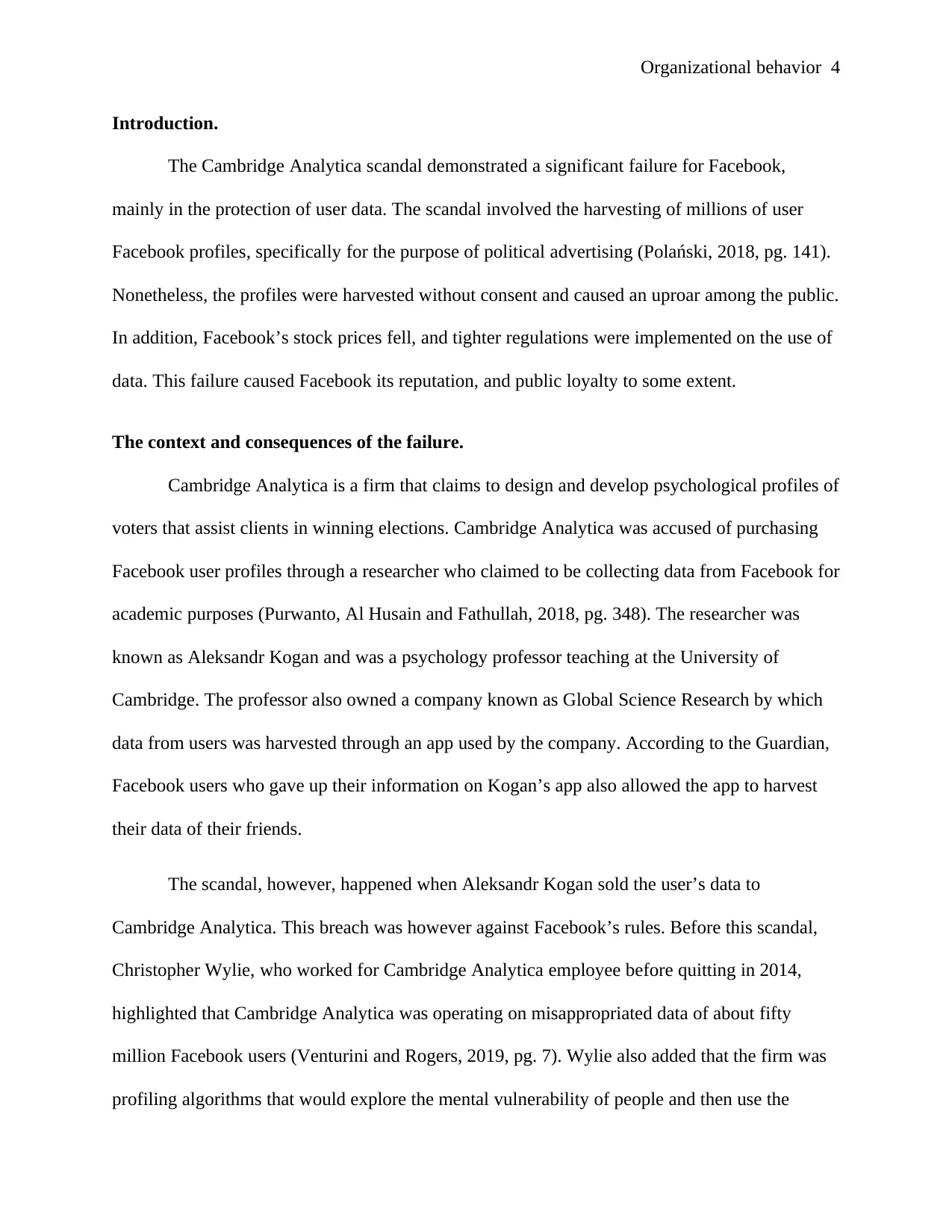
Organizational behavior 4
Introduction.
The Cambridge Analytica scandal demonstrated a significant failure for Facebook,
mainly in the protection of user data. The scandal involved the harvesting of millions of user
Facebook profiles, specifically for the purpose of political advertising (Polański, 2018, pg. 141).
Nonetheless, the profiles were harvested without consent and caused an uproar among the public.
In addition, Facebook’s stock prices fell, and tighter regulations were implemented on the use of
data. This failure caused Facebook its reputation, and public loyalty to some extent.
The context and consequences of the failure.
Cambridge Analytica is a firm that claims to design and develop psychological profiles of
voters that assist clients in winning elections. Cambridge Analytica was accused of purchasing
Facebook user profiles through a researcher who claimed to be collecting data from Facebook for
academic purposes (Purwanto, Al Husain and Fathullah, 2018, pg. 348). The researcher was
known as Aleksandr Kogan and was a psychology professor teaching at the University of
Cambridge. The professor also owned a company known as Global Science Research by which
data from users was harvested through an app used by the company. According to the Guardian,
Facebook users who gave up their information on Kogan’s app also allowed the app to harvest
their data of their friends.
The scandal, however, happened when Aleksandr Kogan sold the user’s data to
Cambridge Analytica. This breach was however against Facebook’s rules. Before this scandal,
Christopher Wylie, who worked for Cambridge Analytica employee before quitting in 2014,
highlighted that Cambridge Analytica was operating on misappropriated data of about fifty
million Facebook users (Venturini and Rogers, 2019, pg. 7). Wylie also added that the firm was
profiling algorithms that would explore the mental vulnerability of people and then use the
Introduction.
The Cambridge Analytica scandal demonstrated a significant failure for Facebook,
mainly in the protection of user data. The scandal involved the harvesting of millions of user
Facebook profiles, specifically for the purpose of political advertising (Polański, 2018, pg. 141).
Nonetheless, the profiles were harvested without consent and caused an uproar among the public.
In addition, Facebook’s stock prices fell, and tighter regulations were implemented on the use of
data. This failure caused Facebook its reputation, and public loyalty to some extent.
The context and consequences of the failure.
Cambridge Analytica is a firm that claims to design and develop psychological profiles of
voters that assist clients in winning elections. Cambridge Analytica was accused of purchasing
Facebook user profiles through a researcher who claimed to be collecting data from Facebook for
academic purposes (Purwanto, Al Husain and Fathullah, 2018, pg. 348). The researcher was
known as Aleksandr Kogan and was a psychology professor teaching at the University of
Cambridge. The professor also owned a company known as Global Science Research by which
data from users was harvested through an app used by the company. According to the Guardian,
Facebook users who gave up their information on Kogan’s app also allowed the app to harvest
their data of their friends.
The scandal, however, happened when Aleksandr Kogan sold the user’s data to
Cambridge Analytica. This breach was however against Facebook’s rules. Before this scandal,
Christopher Wylie, who worked for Cambridge Analytica employee before quitting in 2014,
highlighted that Cambridge Analytica was operating on misappropriated data of about fifty
million Facebook users (Venturini and Rogers, 2019, pg. 7). Wylie also added that the firm was
profiling algorithms that would explore the mental vulnerability of people and then use the
Paraphrase This Document
Need a fresh take? Get an instant paraphrase of this document with our AI Paraphraser
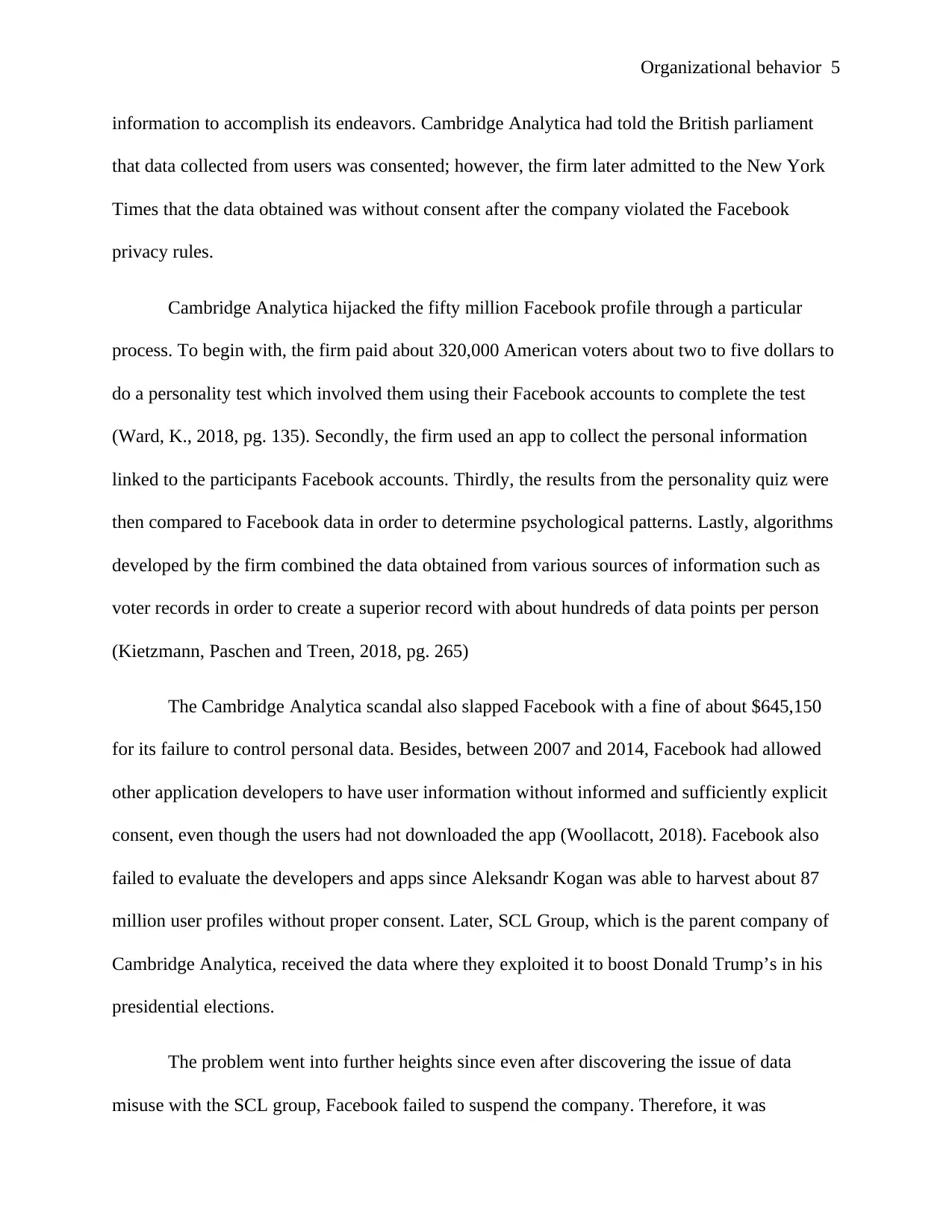
Organizational behavior 5
information to accomplish its endeavors. Cambridge Analytica had told the British parliament
that data collected from users was consented; however, the firm later admitted to the New York
Times that the data obtained was without consent after the company violated the Facebook
privacy rules.
Cambridge Analytica hijacked the fifty million Facebook profile through a particular
process. To begin with, the firm paid about 320,000 American voters about two to five dollars to
do a personality test which involved them using their Facebook accounts to complete the test
(Ward, K., 2018, pg. 135). Secondly, the firm used an app to collect the personal information
linked to the participants Facebook accounts. Thirdly, the results from the personality quiz were
then compared to Facebook data in order to determine psychological patterns. Lastly, algorithms
developed by the firm combined the data obtained from various sources of information such as
voter records in order to create a superior record with about hundreds of data points per person
(Kietzmann, Paschen and Treen, 2018, pg. 265)
The Cambridge Analytica scandal also slapped Facebook with a fine of about $645,150
for its failure to control personal data. Besides, between 2007 and 2014, Facebook had allowed
other application developers to have user information without informed and sufficiently explicit
consent, even though the users had not downloaded the app (Woollacott, 2018). Facebook also
failed to evaluate the developers and apps since Aleksandr Kogan was able to harvest about 87
million user profiles without proper consent. Later, SCL Group, which is the parent company of
Cambridge Analytica, received the data where they exploited it to boost Donald Trump’s in his
presidential elections.
The problem went into further heights since even after discovering the issue of data
misuse with the SCL group, Facebook failed to suspend the company. Therefore, it was
information to accomplish its endeavors. Cambridge Analytica had told the British parliament
that data collected from users was consented; however, the firm later admitted to the New York
Times that the data obtained was without consent after the company violated the Facebook
privacy rules.
Cambridge Analytica hijacked the fifty million Facebook profile through a particular
process. To begin with, the firm paid about 320,000 American voters about two to five dollars to
do a personality test which involved them using their Facebook accounts to complete the test
(Ward, K., 2018, pg. 135). Secondly, the firm used an app to collect the personal information
linked to the participants Facebook accounts. Thirdly, the results from the personality quiz were
then compared to Facebook data in order to determine psychological patterns. Lastly, algorithms
developed by the firm combined the data obtained from various sources of information such as
voter records in order to create a superior record with about hundreds of data points per person
(Kietzmann, Paschen and Treen, 2018, pg. 265)
The Cambridge Analytica scandal also slapped Facebook with a fine of about $645,150
for its failure to control personal data. Besides, between 2007 and 2014, Facebook had allowed
other application developers to have user information without informed and sufficiently explicit
consent, even though the users had not downloaded the app (Woollacott, 2018). Facebook also
failed to evaluate the developers and apps since Aleksandr Kogan was able to harvest about 87
million user profiles without proper consent. Later, SCL Group, which is the parent company of
Cambridge Analytica, received the data where they exploited it to boost Donald Trump’s in his
presidential elections.
The problem went into further heights since even after discovering the issue of data
misuse with the SCL group, Facebook failed to suspend the company. Therefore, it was
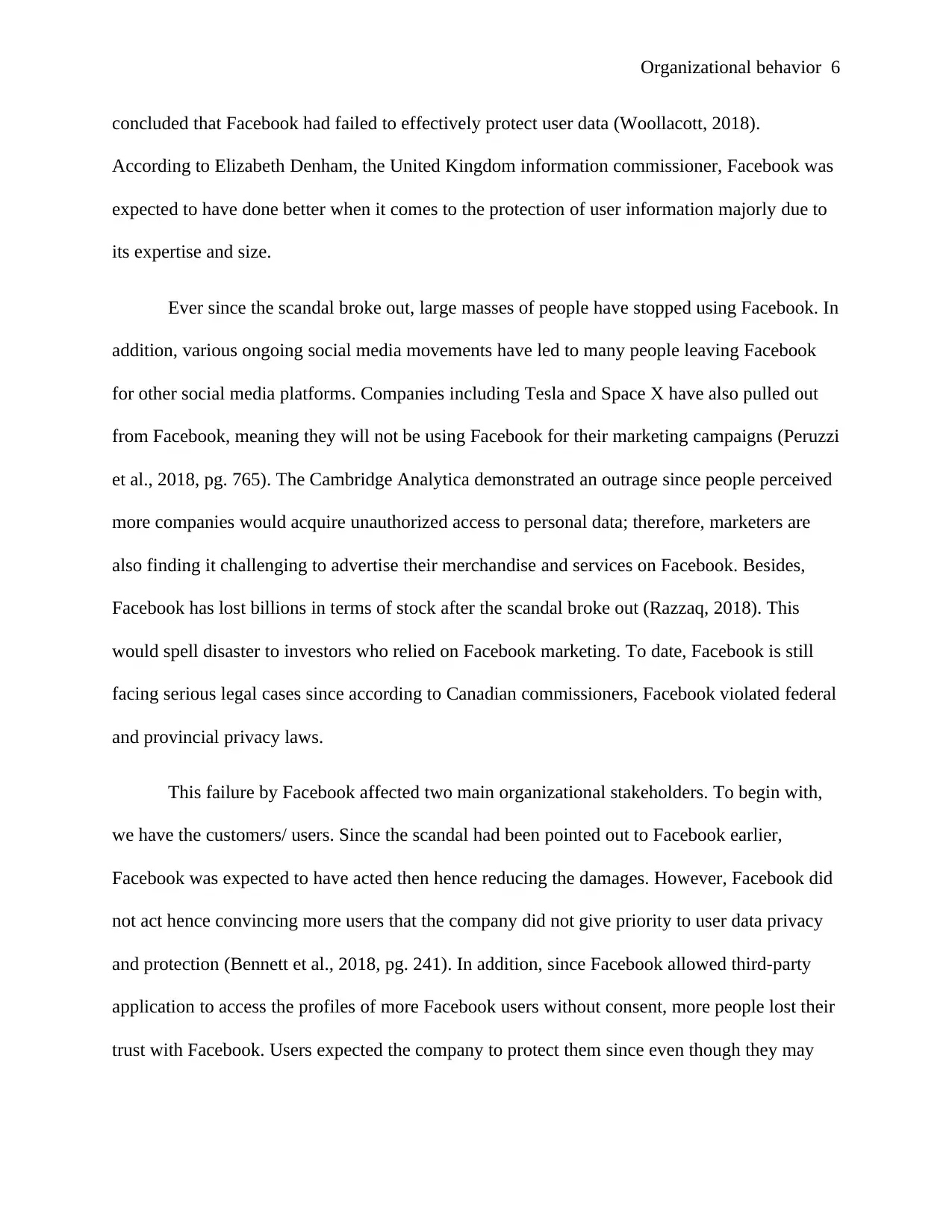
Organizational behavior 6
concluded that Facebook had failed to effectively protect user data (Woollacott, 2018).
According to Elizabeth Denham, the United Kingdom information commissioner, Facebook was
expected to have done better when it comes to the protection of user information majorly due to
its expertise and size.
Ever since the scandal broke out, large masses of people have stopped using Facebook. In
addition, various ongoing social media movements have led to many people leaving Facebook
for other social media platforms. Companies including Tesla and Space X have also pulled out
from Facebook, meaning they will not be using Facebook for their marketing campaigns (Peruzzi
et al., 2018, pg. 765). The Cambridge Analytica demonstrated an outrage since people perceived
more companies would acquire unauthorized access to personal data; therefore, marketers are
also finding it challenging to advertise their merchandise and services on Facebook. Besides,
Facebook has lost billions in terms of stock after the scandal broke out (Razzaq, 2018). This
would spell disaster to investors who relied on Facebook marketing. To date, Facebook is still
facing serious legal cases since according to Canadian commissioners, Facebook violated federal
and provincial privacy laws.
This failure by Facebook affected two main organizational stakeholders. To begin with,
we have the customers/ users. Since the scandal had been pointed out to Facebook earlier,
Facebook was expected to have acted then hence reducing the damages. However, Facebook did
not act hence convincing more users that the company did not give priority to user data privacy
and protection (Bennett et al., 2018, pg. 241). In addition, since Facebook allowed third-party
application to access the profiles of more Facebook users without consent, more people lost their
trust with Facebook. Users expected the company to protect them since even though they may
concluded that Facebook had failed to effectively protect user data (Woollacott, 2018).
According to Elizabeth Denham, the United Kingdom information commissioner, Facebook was
expected to have done better when it comes to the protection of user information majorly due to
its expertise and size.
Ever since the scandal broke out, large masses of people have stopped using Facebook. In
addition, various ongoing social media movements have led to many people leaving Facebook
for other social media platforms. Companies including Tesla and Space X have also pulled out
from Facebook, meaning they will not be using Facebook for their marketing campaigns (Peruzzi
et al., 2018, pg. 765). The Cambridge Analytica demonstrated an outrage since people perceived
more companies would acquire unauthorized access to personal data; therefore, marketers are
also finding it challenging to advertise their merchandise and services on Facebook. Besides,
Facebook has lost billions in terms of stock after the scandal broke out (Razzaq, 2018). This
would spell disaster to investors who relied on Facebook marketing. To date, Facebook is still
facing serious legal cases since according to Canadian commissioners, Facebook violated federal
and provincial privacy laws.
This failure by Facebook affected two main organizational stakeholders. To begin with,
we have the customers/ users. Since the scandal had been pointed out to Facebook earlier,
Facebook was expected to have acted then hence reducing the damages. However, Facebook did
not act hence convincing more users that the company did not give priority to user data privacy
and protection (Bennett et al., 2018, pg. 241). In addition, since Facebook allowed third-party
application to access the profiles of more Facebook users without consent, more people lost their
trust with Facebook. Users expected the company to protect them since even though they may
⊘ This is a preview!⊘
Do you want full access?
Subscribe today to unlock all pages.

Trusted by 1+ million students worldwide
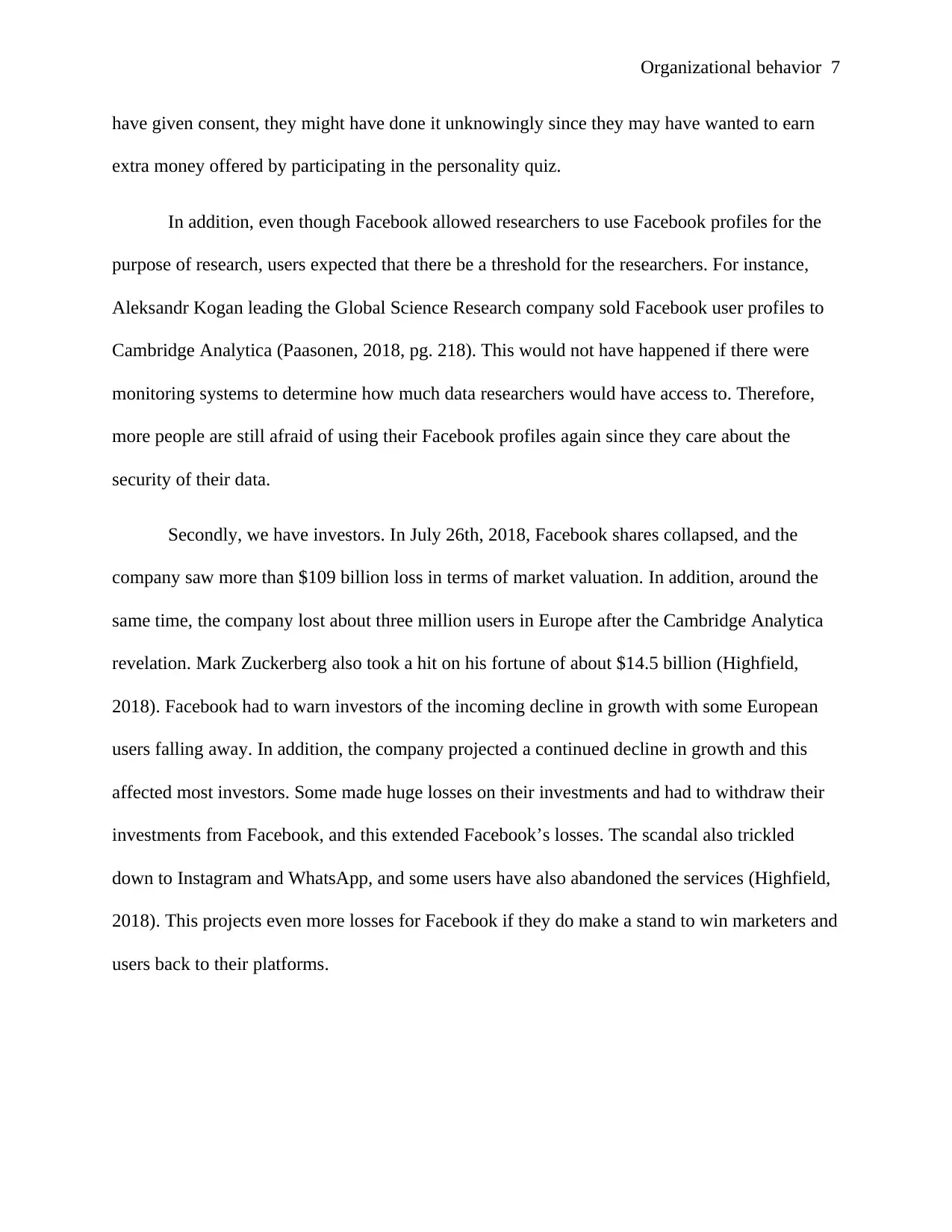
Organizational behavior 7
have given consent, they might have done it unknowingly since they may have wanted to earn
extra money offered by participating in the personality quiz.
In addition, even though Facebook allowed researchers to use Facebook profiles for the
purpose of research, users expected that there be a threshold for the researchers. For instance,
Aleksandr Kogan leading the Global Science Research company sold Facebook user profiles to
Cambridge Analytica (Paasonen, 2018, pg. 218). This would not have happened if there were
monitoring systems to determine how much data researchers would have access to. Therefore,
more people are still afraid of using their Facebook profiles again since they care about the
security of their data.
Secondly, we have investors. In July 26th, 2018, Facebook shares collapsed, and the
company saw more than $109 billion loss in terms of market valuation. In addition, around the
same time, the company lost about three million users in Europe after the Cambridge Analytica
revelation. Mark Zuckerberg also took a hit on his fortune of about $14.5 billion (Highfield,
2018). Facebook had to warn investors of the incoming decline in growth with some European
users falling away. In addition, the company projected a continued decline in growth and this
affected most investors. Some made huge losses on their investments and had to withdraw their
investments from Facebook, and this extended Facebook’s losses. The scandal also trickled
down to Instagram and WhatsApp, and some users have also abandoned the services (Highfield,
2018). This projects even more losses for Facebook if they do make a stand to win marketers and
users back to their platforms.
have given consent, they might have done it unknowingly since they may have wanted to earn
extra money offered by participating in the personality quiz.
In addition, even though Facebook allowed researchers to use Facebook profiles for the
purpose of research, users expected that there be a threshold for the researchers. For instance,
Aleksandr Kogan leading the Global Science Research company sold Facebook user profiles to
Cambridge Analytica (Paasonen, 2018, pg. 218). This would not have happened if there were
monitoring systems to determine how much data researchers would have access to. Therefore,
more people are still afraid of using their Facebook profiles again since they care about the
security of their data.
Secondly, we have investors. In July 26th, 2018, Facebook shares collapsed, and the
company saw more than $109 billion loss in terms of market valuation. In addition, around the
same time, the company lost about three million users in Europe after the Cambridge Analytica
revelation. Mark Zuckerberg also took a hit on his fortune of about $14.5 billion (Highfield,
2018). Facebook had to warn investors of the incoming decline in growth with some European
users falling away. In addition, the company projected a continued decline in growth and this
affected most investors. Some made huge losses on their investments and had to withdraw their
investments from Facebook, and this extended Facebook’s losses. The scandal also trickled
down to Instagram and WhatsApp, and some users have also abandoned the services (Highfield,
2018). This projects even more losses for Facebook if they do make a stand to win marketers and
users back to their platforms.
Paraphrase This Document
Need a fresh take? Get an instant paraphrase of this document with our AI Paraphraser
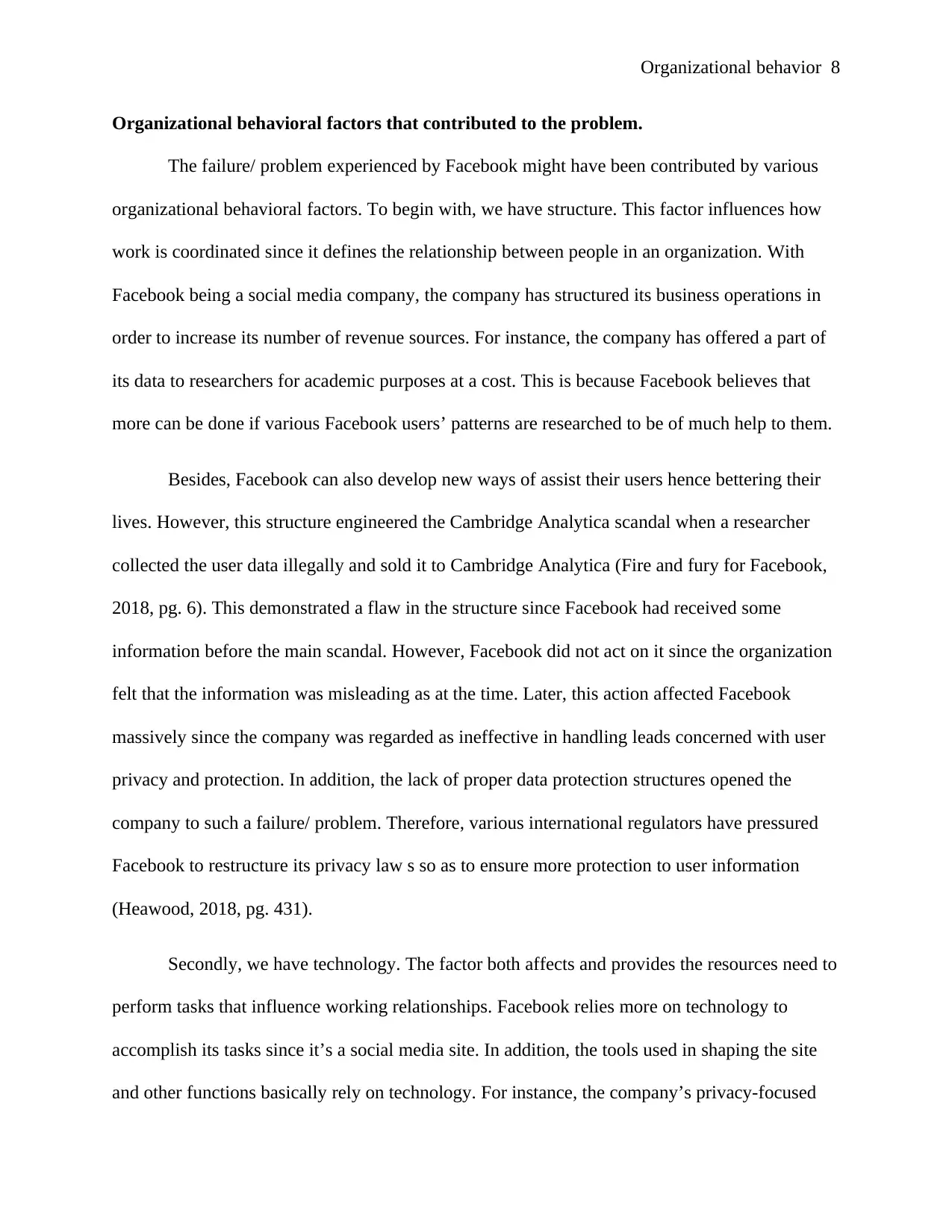
Organizational behavior 8
Organizational behavioral factors that contributed to the problem.
The failure/ problem experienced by Facebook might have been contributed by various
organizational behavioral factors. To begin with, we have structure. This factor influences how
work is coordinated since it defines the relationship between people in an organization. With
Facebook being a social media company, the company has structured its business operations in
order to increase its number of revenue sources. For instance, the company has offered a part of
its data to researchers for academic purposes at a cost. This is because Facebook believes that
more can be done if various Facebook users’ patterns are researched to be of much help to them.
Besides, Facebook can also develop new ways of assist their users hence bettering their
lives. However, this structure engineered the Cambridge Analytica scandal when a researcher
collected the user data illegally and sold it to Cambridge Analytica (Fire and fury for Facebook,
2018, pg. 6). This demonstrated a flaw in the structure since Facebook had received some
information before the main scandal. However, Facebook did not act on it since the organization
felt that the information was misleading as at the time. Later, this action affected Facebook
massively since the company was regarded as ineffective in handling leads concerned with user
privacy and protection. In addition, the lack of proper data protection structures opened the
company to such a failure/ problem. Therefore, various international regulators have pressured
Facebook to restructure its privacy law s so as to ensure more protection to user information
(Heawood, 2018, pg. 431).
Secondly, we have technology. The factor both affects and provides the resources need to
perform tasks that influence working relationships. Facebook relies more on technology to
accomplish its tasks since it’s a social media site. In addition, the tools used in shaping the site
and other functions basically rely on technology. For instance, the company’s privacy-focused
Organizational behavioral factors that contributed to the problem.
The failure/ problem experienced by Facebook might have been contributed by various
organizational behavioral factors. To begin with, we have structure. This factor influences how
work is coordinated since it defines the relationship between people in an organization. With
Facebook being a social media company, the company has structured its business operations in
order to increase its number of revenue sources. For instance, the company has offered a part of
its data to researchers for academic purposes at a cost. This is because Facebook believes that
more can be done if various Facebook users’ patterns are researched to be of much help to them.
Besides, Facebook can also develop new ways of assist their users hence bettering their
lives. However, this structure engineered the Cambridge Analytica scandal when a researcher
collected the user data illegally and sold it to Cambridge Analytica (Fire and fury for Facebook,
2018, pg. 6). This demonstrated a flaw in the structure since Facebook had received some
information before the main scandal. However, Facebook did not act on it since the organization
felt that the information was misleading as at the time. Later, this action affected Facebook
massively since the company was regarded as ineffective in handling leads concerned with user
privacy and protection. In addition, the lack of proper data protection structures opened the
company to such a failure/ problem. Therefore, various international regulators have pressured
Facebook to restructure its privacy law s so as to ensure more protection to user information
(Heawood, 2018, pg. 431).
Secondly, we have technology. The factor both affects and provides the resources need to
perform tasks that influence working relationships. Facebook relies more on technology to
accomplish its tasks since it’s a social media site. In addition, the tools used in shaping the site
and other functions basically rely on technology. For instance, the company’s privacy-focused
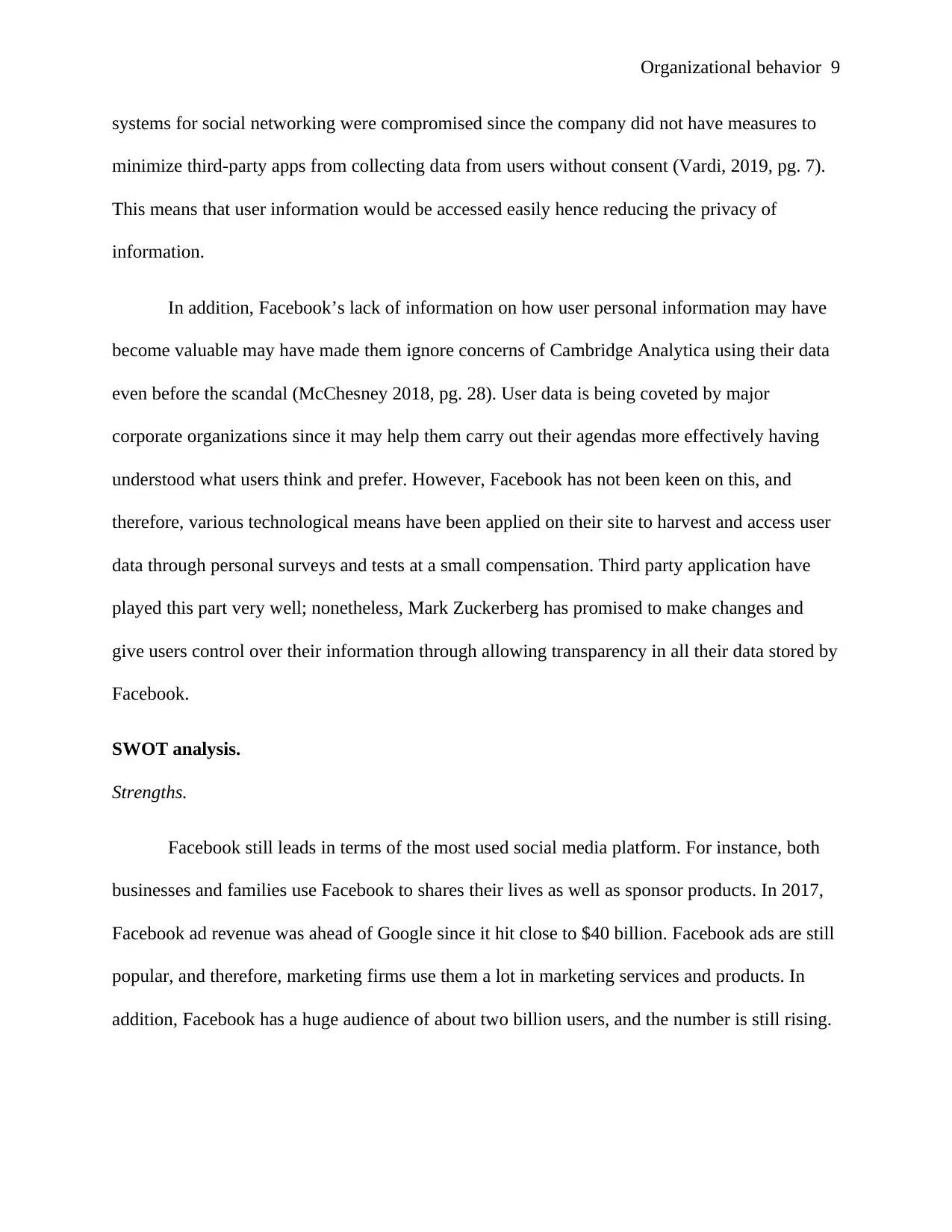
Organizational behavior 9
systems for social networking were compromised since the company did not have measures to
minimize third-party apps from collecting data from users without consent (Vardi, 2019, pg. 7).
This means that user information would be accessed easily hence reducing the privacy of
information.
In addition, Facebook’s lack of information on how user personal information may have
become valuable may have made them ignore concerns of Cambridge Analytica using their data
even before the scandal (McChesney 2018, pg. 28). User data is being coveted by major
corporate organizations since it may help them carry out their agendas more effectively having
understood what users think and prefer. However, Facebook has not been keen on this, and
therefore, various technological means have been applied on their site to harvest and access user
data through personal surveys and tests at a small compensation. Third party application have
played this part very well; nonetheless, Mark Zuckerberg has promised to make changes and
give users control over their information through allowing transparency in all their data stored by
Facebook.
SWOT analysis.
Strengths.
Facebook still leads in terms of the most used social media platform. For instance, both
businesses and families use Facebook to shares their lives as well as sponsor products. In 2017,
Facebook ad revenue was ahead of Google since it hit close to $40 billion. Facebook ads are still
popular, and therefore, marketing firms use them a lot in marketing services and products. In
addition, Facebook has a huge audience of about two billion users, and the number is still rising.
systems for social networking were compromised since the company did not have measures to
minimize third-party apps from collecting data from users without consent (Vardi, 2019, pg. 7).
This means that user information would be accessed easily hence reducing the privacy of
information.
In addition, Facebook’s lack of information on how user personal information may have
become valuable may have made them ignore concerns of Cambridge Analytica using their data
even before the scandal (McChesney 2018, pg. 28). User data is being coveted by major
corporate organizations since it may help them carry out their agendas more effectively having
understood what users think and prefer. However, Facebook has not been keen on this, and
therefore, various technological means have been applied on their site to harvest and access user
data through personal surveys and tests at a small compensation. Third party application have
played this part very well; nonetheless, Mark Zuckerberg has promised to make changes and
give users control over their information through allowing transparency in all their data stored by
Facebook.
SWOT analysis.
Strengths.
Facebook still leads in terms of the most used social media platform. For instance, both
businesses and families use Facebook to shares their lives as well as sponsor products. In 2017,
Facebook ad revenue was ahead of Google since it hit close to $40 billion. Facebook ads are still
popular, and therefore, marketing firms use them a lot in marketing services and products. In
addition, Facebook has a huge audience of about two billion users, and the number is still rising.
⊘ This is a preview!⊘
Do you want full access?
Subscribe today to unlock all pages.

Trusted by 1+ million students worldwide
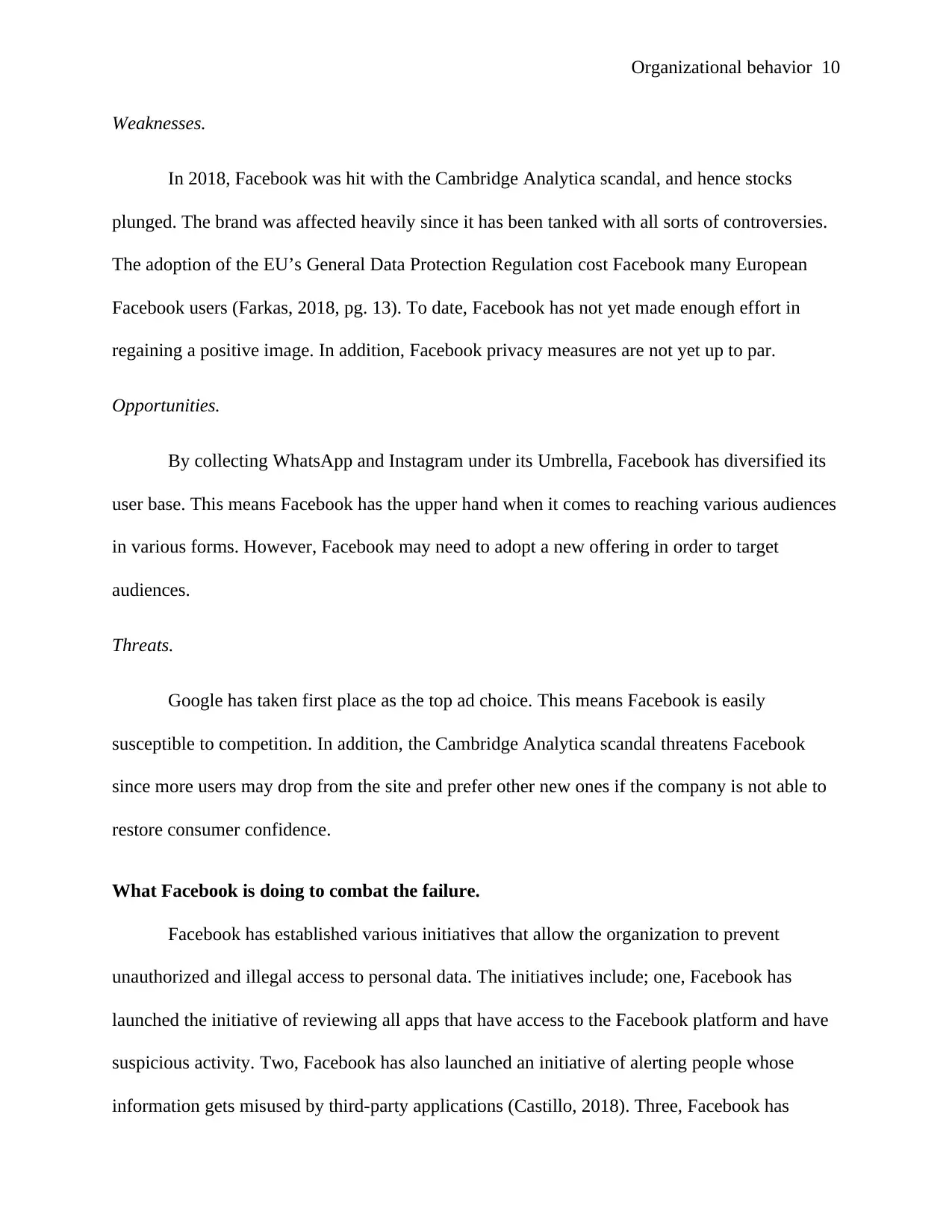
Organizational behavior 10
Weaknesses.
In 2018, Facebook was hit with the Cambridge Analytica scandal, and hence stocks
plunged. The brand was affected heavily since it has been tanked with all sorts of controversies.
The adoption of the EU’s General Data Protection Regulation cost Facebook many European
Facebook users (Farkas, 2018, pg. 13). To date, Facebook has not yet made enough effort in
regaining a positive image. In addition, Facebook privacy measures are not yet up to par.
Opportunities.
By collecting WhatsApp and Instagram under its Umbrella, Facebook has diversified its
user base. This means Facebook has the upper hand when it comes to reaching various audiences
in various forms. However, Facebook may need to adopt a new offering in order to target
audiences.
Threats.
Google has taken first place as the top ad choice. This means Facebook is easily
susceptible to competition. In addition, the Cambridge Analytica scandal threatens Facebook
since more users may drop from the site and prefer other new ones if the company is not able to
restore consumer confidence.
What Facebook is doing to combat the failure.
Facebook has established various initiatives that allow the organization to prevent
unauthorized and illegal access to personal data. The initiatives include; one, Facebook has
launched the initiative of reviewing all apps that have access to the Facebook platform and have
suspicious activity. Two, Facebook has also launched an initiative of alerting people whose
information gets misused by third-party applications (Castillo, 2018). Three, Facebook has
Weaknesses.
In 2018, Facebook was hit with the Cambridge Analytica scandal, and hence stocks
plunged. The brand was affected heavily since it has been tanked with all sorts of controversies.
The adoption of the EU’s General Data Protection Regulation cost Facebook many European
Facebook users (Farkas, 2018, pg. 13). To date, Facebook has not yet made enough effort in
regaining a positive image. In addition, Facebook privacy measures are not yet up to par.
Opportunities.
By collecting WhatsApp and Instagram under its Umbrella, Facebook has diversified its
user base. This means Facebook has the upper hand when it comes to reaching various audiences
in various forms. However, Facebook may need to adopt a new offering in order to target
audiences.
Threats.
Google has taken first place as the top ad choice. This means Facebook is easily
susceptible to competition. In addition, the Cambridge Analytica scandal threatens Facebook
since more users may drop from the site and prefer other new ones if the company is not able to
restore consumer confidence.
What Facebook is doing to combat the failure.
Facebook has established various initiatives that allow the organization to prevent
unauthorized and illegal access to personal data. The initiatives include; one, Facebook has
launched the initiative of reviewing all apps that have access to the Facebook platform and have
suspicious activity. Two, Facebook has also launched an initiative of alerting people whose
information gets misused by third-party applications (Castillo, 2018). Three, Facebook has
Paraphrase This Document
Need a fresh take? Get an instant paraphrase of this document with our AI Paraphraser
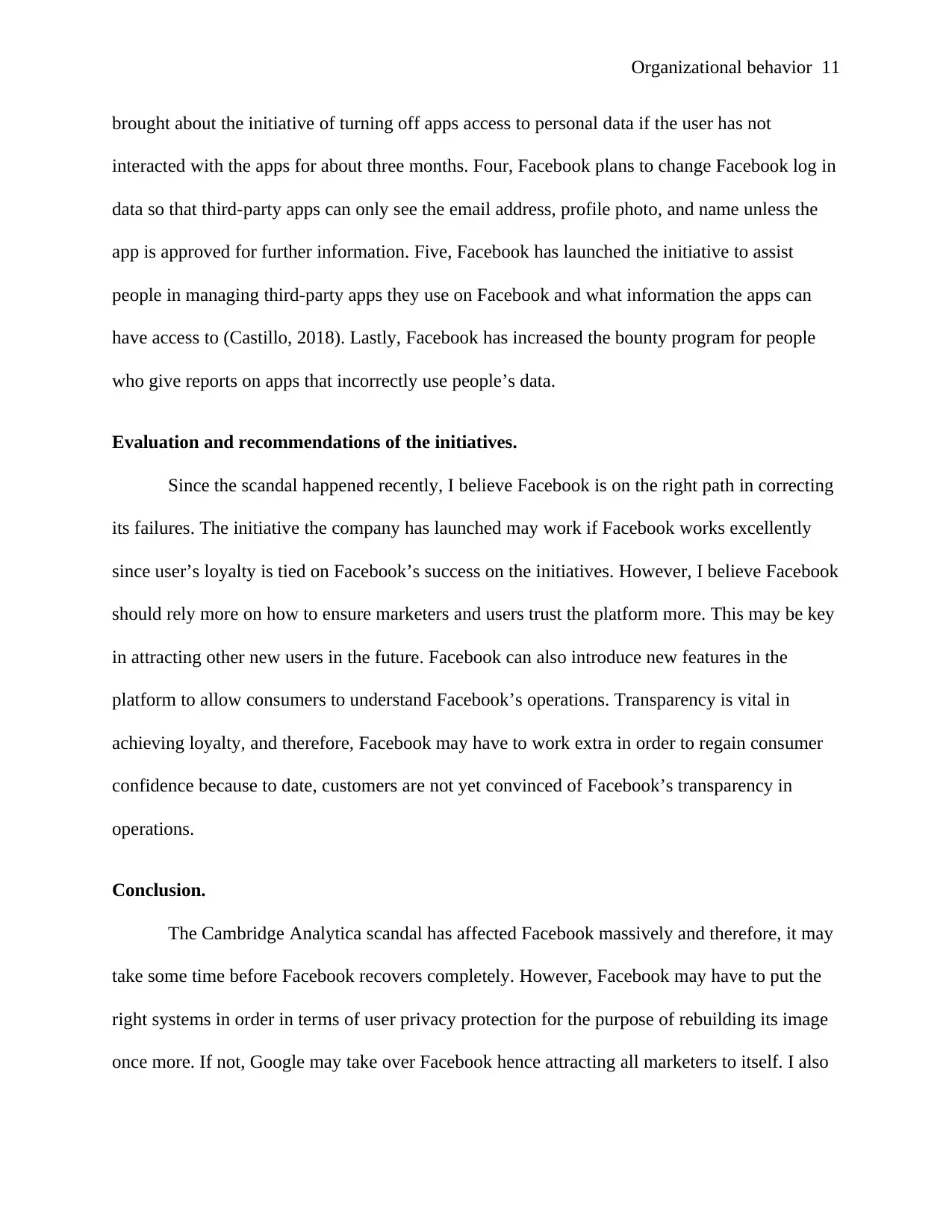
Organizational behavior 11
brought about the initiative of turning off apps access to personal data if the user has not
interacted with the apps for about three months. Four, Facebook plans to change Facebook log in
data so that third-party apps can only see the email address, profile photo, and name unless the
app is approved for further information. Five, Facebook has launched the initiative to assist
people in managing third-party apps they use on Facebook and what information the apps can
have access to (Castillo, 2018). Lastly, Facebook has increased the bounty program for people
who give reports on apps that incorrectly use people’s data.
Evaluation and recommendations of the initiatives.
Since the scandal happened recently, I believe Facebook is on the right path in correcting
its failures. The initiative the company has launched may work if Facebook works excellently
since user’s loyalty is tied on Facebook’s success on the initiatives. However, I believe Facebook
should rely more on how to ensure marketers and users trust the platform more. This may be key
in attracting other new users in the future. Facebook can also introduce new features in the
platform to allow consumers to understand Facebook’s operations. Transparency is vital in
achieving loyalty, and therefore, Facebook may have to work extra in order to regain consumer
confidence because to date, customers are not yet convinced of Facebook’s transparency in
operations.
Conclusion.
The Cambridge Analytica scandal has affected Facebook massively and therefore, it may
take some time before Facebook recovers completely. However, Facebook may have to put the
right systems in order in terms of user privacy protection for the purpose of rebuilding its image
once more. If not, Google may take over Facebook hence attracting all marketers to itself. I also
brought about the initiative of turning off apps access to personal data if the user has not
interacted with the apps for about three months. Four, Facebook plans to change Facebook log in
data so that third-party apps can only see the email address, profile photo, and name unless the
app is approved for further information. Five, Facebook has launched the initiative to assist
people in managing third-party apps they use on Facebook and what information the apps can
have access to (Castillo, 2018). Lastly, Facebook has increased the bounty program for people
who give reports on apps that incorrectly use people’s data.
Evaluation and recommendations of the initiatives.
Since the scandal happened recently, I believe Facebook is on the right path in correcting
its failures. The initiative the company has launched may work if Facebook works excellently
since user’s loyalty is tied on Facebook’s success on the initiatives. However, I believe Facebook
should rely more on how to ensure marketers and users trust the platform more. This may be key
in attracting other new users in the future. Facebook can also introduce new features in the
platform to allow consumers to understand Facebook’s operations. Transparency is vital in
achieving loyalty, and therefore, Facebook may have to work extra in order to regain consumer
confidence because to date, customers are not yet convinced of Facebook’s transparency in
operations.
Conclusion.
The Cambridge Analytica scandal has affected Facebook massively and therefore, it may
take some time before Facebook recovers completely. However, Facebook may have to put the
right systems in order in terms of user privacy protection for the purpose of rebuilding its image
once more. If not, Google may take over Facebook hence attracting all marketers to itself. I also
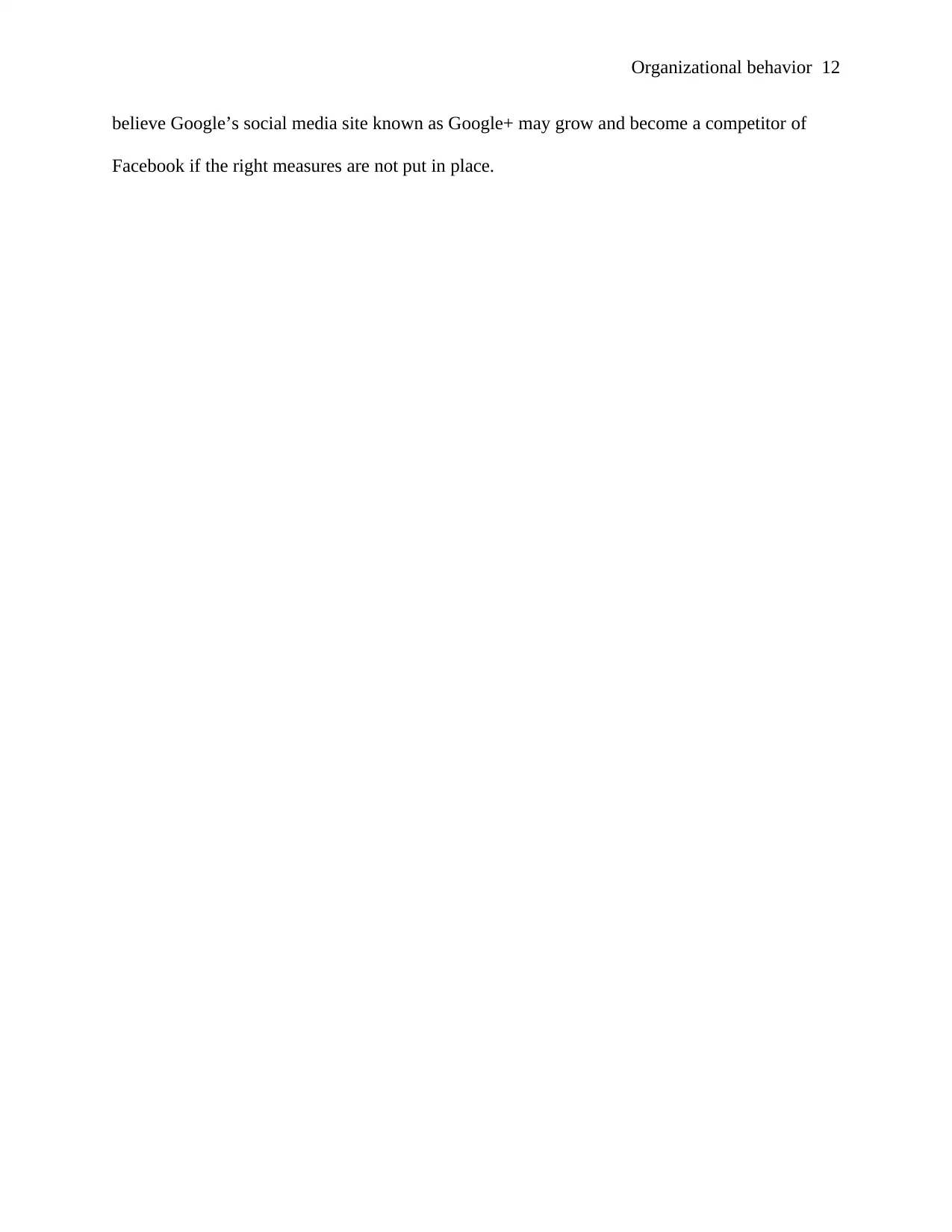
Organizational behavior 12
believe Google’s social media site known as Google+ may grow and become a competitor of
Facebook if the right measures are not put in place.
believe Google’s social media site known as Google+ may grow and become a competitor of
Facebook if the right measures are not put in place.
⊘ This is a preview!⊘
Do you want full access?
Subscribe today to unlock all pages.

Trusted by 1+ million students worldwide
1 out of 15
Related Documents
Your All-in-One AI-Powered Toolkit for Academic Success.
+13062052269
info@desklib.com
Available 24*7 on WhatsApp / Email
![[object Object]](/_next/static/media/star-bottom.7253800d.svg)
Unlock your academic potential
Copyright © 2020–2026 A2Z Services. All Rights Reserved. Developed and managed by ZUCOL.





